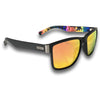What Are Polarized Lenses For?

What Are Polarized Lenses For?
Dubery Polarized Lenses can improve clarity and reduce eye strain on bright sunny days. This is awesome news to outdoor enthusiasts like fishing who become frustrated and even temporarily blinded by the reflected light and glare of the sun. Having a bright shaft of sunlight hit you directly in the eyes is both annoying and potentially dangerous.
Usually light scatters because it bounces at varying angles off an object’s uneven surface. But if the surface is smooth, as with calm water or a flat piece of sheet metal, light reflects at one angle—such as right in your eyes. This is what we know as glare.
Fortunately, today’s sunglasses—with or without prescription—can be modified with a technique called polarization to reduce light glare and improve vision and safety in the sun.
How does Polarized Lenses Work
Polarized lenses have a special chemical applied to them to filter light. The chemical’s molecules are lined up specifically to block some of the light from passing through the polarized lens. Think of it like a miniblind hanging in front of a window. Only light that passes through the blind’s openings can be seen.
On polarized sunglasses, the filter creates vertical openings for light. This means that only light rays that approach your eyes vertically can fit through those openings. The polarized lenses will block out all the horizontal light waves bouncing off a smooth pond or a shiny car hood, for instance.
As a result, the image you see with polarized lenses is a bit darker than usual, but objects look crisper and clearer, and details are easier to see. People who use polarized lensed sunglasses for long stretches of time often say they are less tired than usual after hours of battling sun glare. People who fish, in particular, find polarized lenses sunglasses drastically cut the glare and help them see into the water better catching more fish.
When Not to Use Polarized Glasses
There are a few instances where polarized lenses are not recommended. For instance, you will have difficulty seeing images on LCD (liquid crystal display) screens such as:
- car dashboard controls
- ATM cash machines
- cell phones and some watches
It is important to keep in mind that if your sunglasses are labeled as blocking the sun’s harmful ultraviolet (UV) rays, it does not mean they are polarized too. Polarized lenses will be labeled as such.
Alternatives to polarized lenses
Some people may find polarized glasses uncomfortable or may be unable to wear them due to their work. If you can’t wear polarized lenses for whatever reason, there are alternatives available:
- Anti-reflective coating is available for sunglasses and reading glasses.
- Mirrored sunglasses help decrease how much light enters your eyes.
- Photochromic lenses automatically darken when exposed to a certain amount of light.
Polarized lenses vs. UV protection
Polarized lenses and UV-protected lenses aren’t the same thing. So, it’s important to remember that polarized lenses don’t provide UV protection unless otherwise labeled.
UV protection alone also doesn’t make a pair of sunglasses effective against reflected beams of light and glare.
UV-protected lenses work by shielding your eyes against harmful UV exposure, which is linked to cataracts and eye damage. Even short-term exposure to harsh UV light can cause temporary blindness. It’s important to always wear sunglasses with 99 or 100% UV protection when you’re outside.
However, since UV lenses don’t prevent glare, you should look for sunglasses that are both polarized and offer UV protection.
Most sunglasses are designed to protect our eyes from the sun's harmful effects. Often the labels on sunglasses promise protection from ultraviolet light and other kinds of natural radiation. It is important to know what kind of light you need to protect your eyes from and what type of light is not necessarily harmful.
Blocks 99 percent of ultraviolet rays
You should always buy sunglasses with this feature. Long-term exposure to ultraviolet (UV) radiation in sunlight is linked to cataracts and eye growths, including cancer. UVB radiation is considered more dangerous to the eyes and skin than UVA radiation.
Both plastic and glass lenses absorb some UV light, but UV absorption can be improved by adding chemicals to the lens material during manufacturing or by applying special lens coatings.
Look for sunglasses that block 99 percent or 100 percent of all UV light. Some manufacturer's labels say "UV absorption up to 400nm." This is the same thing as 100 percent UV absorption.
Ground and polished
Some nonprescription glasses are ground and polished to improve the quality of the lenses. Nonprescription lenses that are not ground and polished will not hurt your eyes.
You do want to make sure that the lenses you buy are made properly. To judge the quality of nonprescription sunglasses, look at something with a rectangular pattern, such as floor tile. Hold the glasses at a comfortable distance and cover one eye. Move the glasses slowly from side to side, then up and down. If the lines stay straight, the lenses are fine. If the lines wiggle, especially in the center of the lens, try another pair.
Impact resistant
All sunglasses must meet impact standards set by the Federal Food and Drug Administration (FDA) for safety. No lens is truly unbreakable, but plastic lenses are less likely than glass lenses to shatter when hit by a ball or stone.
Most nonprescription sunglass lenses are plastic. Polycarbonate plastic sunglasses, used in many sports, are especially tough, but they scratch easily. If you buy polycarbonate lenses, look for ones with scratch-resistant coatings.
Polarized
Polarized lenses cut reflected glare — sunlight that bounces off smooth surfaces like pavement, car windows, chromed surfaces or water. They can be particularly useful for driving and fishing.
Polarization has nothing to do with UV light absorption, but many polarized lenses are now combined with a UV-blocking substance. Check the label to make sure the lenses provide maximum UV protection.
Lens darkness
A medium lens is good for day-to-day wear, but if you use the glasses for very bright conditions, choose a darker lens.
The color and the degree of darkness do not tell you anything about the lenses' ability to block UV light.
Photochromic
A photochromic glasses lens automatically darkens in bright light and becomes lighter in low light. Most of the darkening takes place in about half a minute, while the lightening takes about five minutes. Photochromic lenses come in a uniform or gradient tint.
Although photochromic lenses may be good UV-absorbent sunglasses (again, the label must state this benefit), it takes time for them to adjust to different light conditions.
Wraparound style
Wraparound glasses are shaped to keep light from shining around the frames and into your eyes.
Studies have shown that enough UV rays enter around ordinary eyeglass frames to reduce the benefits of protective lenses. Large-framed wraparound sunglasses can protect your eyes from all angles.
Gradient lenses
Gradient lenses are permanently shaded from top to bottom or from top and bottom toward the middle. Single gradient lenses (dark on top and lighter on the bottom) can cut glare from the sky but allow you to see clearly below. They are useful for driving because they don't dim your view of the dashboard. They're not as good, however, at reducing glare in snowy surroundings or at the beach.
Double-gradient lenses (dark on top and bottom and lighter in the middle) may be better for sports where light reflects up off the water or snow, such as sailing or skiing.
Double-gradient lenses are not recommended for driving because they make the dashboard appear dim.
Mirror coated
Mirror finishes are thin layers of various metallic coatings on an ordinary lens. Although they do reduce the amount of visible light entering your eyes, do not assume they will fully protect you against UV radiation.
Blocks 90 percent of infrared rays
Infrared wavelengths are invisible and produce heat. Sunlight has low levels of infrared rays, and the eye tolerates infrared well.
Some sunglass manufacturers make health claims for their products based on infrared protection, but research has not shown a close connection between eye disease and infrared rays.
Blue-blocking
Whether blue light is harmful to the eye is still controversial. Lenses that block all blue light are usually amber colored and make your surroundings look yellow or orange. The tint supposedly makes distant objects appear more distinct, especially in snow or haze. For this reason, amber sunglasses are popular among skiers, hunters, boaters and pilots.
Recognizing polarized lenses
It’s fairly easy to find out if your sunglasses are polarized. Try looking at a reflective surface both with and without the lenses. Polarized lenses work by reducing glare from bright light off reflective surfaces and slightly increasing contrast, so they should make it easier to see things clearly in bright light.
Another way to check for polarized lenses is by looking at an LCD screen. Polarization can often make it more difficult to see screens than through regular tinted lenses. Through polarized lenses, LCD screens look black or very dark.
The takeaway
Polarized lenses are a great option for anyone who is spending a lot of time outdoors. Not only do they reduce bright reflection and unwanted glare, polarized lenses also help improve vision clarity in bright situations.
Remember, polarized sunglasses won’t protect you from staring directly at the sun. You should always take precautions to protect your eyes from harmful UV light, even when it’s not particularly bright outside.
When you’re shopping for sunglasses, don’t just consider appearance. Polarized lenses are one of a handful of sunglass options that you have to keep your eyes healthy in sunlight.



